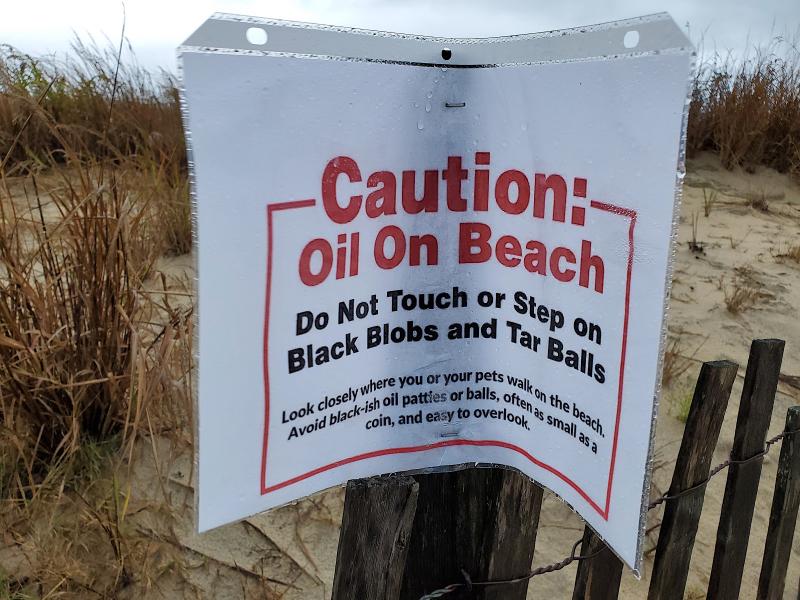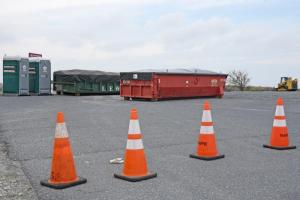The Maryland Department of the Environment has joined the U.S. Coast Guard and the Delaware Department of Natural Resources and Environmental Control in a joint response, overseeing the cleanup operation of tar balls and oiled debris scattered along the shoreline from Bowers Beach to Ocean City, Md.
As crews under the unified command continue to pick up the coin- to pancake-sized tar balls, beachgoers are strongly advised to stay out of the water and avoid walking along the wrack line, where oily debris is deposited by each high tide. The oily debris that has come ashore has caused the towns of Lewes, Dewey Beach and Bethany Beach to close their beaches until further notice. However, Rehoboth Beach’s beach remains open.
In an interview Oct. 28, Rehoboth Beach Mayor Stan Mills said city staff is monitoring the debris daily and has installed signs on all the dune crossings warning visitors of the oil.
The four-wheel-drive surf-fishing crossing at Delaware Beach Plum Island Nature Preserve, managed by Delaware State Parks, also remains closed so cleanup operations will not be hampered by vehicles tracking oil onto the sand.
“We’re not sure how long oily debris will continue to wash up with the tide,” said DNREC Secretary Shawn Garvin, who was on scene Oct. 28 surveying oil on the Delaware beaches. “Unfortunately, oil can be very persistent in the marine environment, but our environmental professionals are persistent too. They’re out there, working up and down the coastline, getting it out of the sand as much as possible. I have put out a call for additional resources from within DNREC this week and the response has been outstanding – with their help and the effort from our federal partner the Coast Guard, we’re making progress on this incident.”
As of Oct. 27, cleanup crews of more than 100 personnel had successfully recovered about 65 tons of oily debris and sand from Delaware beaches.
“At this point in the response, we're critically examining our resources, looking at the big picture and seeing where the greatest needs lie,” said Lt. Cmdr. Fredrick Pugh, federal incident commander for the response. “We'll continue to assess the situation across all impacted coastlines through our on-the-ground experts and through the diligence of our local partners in the affected municipalities.”
The unified command dispatched the cleanup crews to South Bethany Oct. 27, ahead of the U.S. Army Corps of Engineers, which started a planned beach replenishment. Garvin also dispatched an advance crew of 15 DNREC personnel to comb the beach at South Bethany for tar balls and oil patties before new sand was pumped onto the beach there. DNREC established a line of communication with the Army Corps of Engineers’ replenishment contractor to ensure that any significant deposits of oil sighted on the beach can be removed before sand pumped ashore could cover them over.
Crews have surveyed the stretch of coastline by air, land and sea. This week, officials say the oily material that has been spreading along the coast is all from the original amount discovered last week that has been moved repeatedly by the waves and tide, being broken into smaller and smaller pieces. Response officials do not believe there is an ongoing or undiscovered patch of oil out in the bay or ocean.
The Coast Guard has not ruled out any possible sources. It has sent samples of the oil to be analyzed by its Marine Safety Laboratory for a “petroleum fingerprint” that might help determine the source of the spill. If a source is identified, the responsible party would be required to reimburse the federal government for the cleanup operation.
With Tropical Storm Zeta likely to make working conditions difficult later in the week, the unified command may suspend the cleanup operation temporarily while the storm passes through before resuming it over the weekend and continuing into next week.
The public is asked to continue reporting any findings of oil patties or oiled wildlife. For reports concerning the Delaware coastline, call DNREC's environmental hotline at 800-662-8802. For reports concerning the Maryland coastline, call the Maryland Department of the Environment at 866-633-4686.
Editor’s Note: This story has been updated with a comment from Rehoboth Beach Mayor Stan Mills.



















































